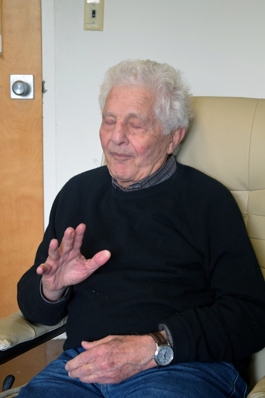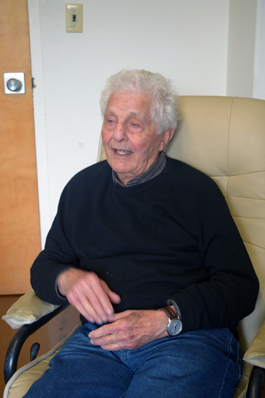Story by Donald H. Harrison; photos by Shor M. Masori


BERKELEY, California – For some two dozen years, Dr. Robert Alter, now a professor emeritus of comparative literature at UC Berkeley, retranslated various portions of the Hebrew Bible. He was distressed that most previous translations “were not only deficient, but I would say that they were wretched.”
In his view, other translations—with a “partial exception for the King James Version” – have a “very shaky sense of English style, and then they don’t pay attention to the literary style of the Hebrew. They run roughshod over it in all kinds of ways.”
Interviewed in his campus office, Alter said that in completing last year the 11.5 pound, three-volume, 3,500-page English translation of the Bible, he had the opportunity “to conduct a simultaneous love affair with two great loves – the Hebrew language and the English language.”
“The way I would fault the existing translations is that they may studiously study the Hebrew language, but there is not a lot of evidence that they love it, and they certainly don’t love the English language on the evidence of the way that they produce English,” he said.
The King James Version was translated during the 17th century by a committee headed by Lancelot Andrewes, a bishop in the Church of England. Andrewes, in Alter’s opinion, “was a fine prose stylist.” His committee “followed a sensible route which I do too in trying to emulate the prose narratives, the contours of the Hebrew, the syntax, literal word choice, and so forth,” the comparative literature professor said.
Alter said the King James Version “is an eloquent translation, but the eloquence is actually more intermittent than people remember. There are lines of poetry that are wonderful, and then in the next line they lose all rhythm and just sprawl all over the place. I think they weren’t listening to the sound of the Hebrew; they were just deciphering it from the printed page. So, it has many virtues, but it also has many flaws. The modern translations (post King James Version), I think, are all disastrous.”


While not a published poet himself, Alter said he is enchanted by “the verbal magic of the Hebrew which speaks to me very profoundly.” He said his translation is attentive to the rhythm of the Hebrew language. “I then try to find English equivalence, even often to the exact rhythms of Hebrew,” he said. “If there is word play or sound play in the Hebrew alliteration, I try to reproduce that, which I don’t see other people doing.”
Some examples?
In Genesis 1:16, the King James Version reads: “Then God made two great lights; the greater light to rule the day, and the lesser night to rule the night. He made the stars also.” The Art Scroll Tanach (Stone edition) renders the same verse: “And God made the two great luminaries, the greater luminary to dominate the day and the lesser luminary to dominate the night; and the stars.”
Alter was dissatisfied with both versions. He renders the verse “…the great light for dominion of day and the small light for dominion of night, and the stars.” The cadence of the sentence is similar to the Hebrew, which reads “Hamamor hagadol l’memshelet hayom v’et hamamor hakaton l’memshelet halailah.” Moreover, said Alter, the verb “to dominate” does not belong in that phrase; it is “a very good example of the tin ear for English usage that is reflected in the modern translations. ‘To dominate’ should appear in a sentence like ‘The Soviet Union dominated the smaller states of Eastern Europe after the Second World War.’ It doesn’t belong to the sun and the moon. Also, I am tempted to say that it might be associated with a verse about a lady in high black boots…”
Why makes this difference important? “The priestly writer who is responsible for the first chapter of Genesis is someone who sees creation as a beautiful, choreographed order n which everything falls into place by divine decree,” Alter declared. “Now the stately rhythms are a kind of reinforcement of that sense of harmonious order and if you take out the rhythms, you take out something important.”
The professor cited another example from the 30th Psalm. One line is translated from the Hebrew in the King James Version as “What profit is there in my blood?” whereas the Art Scroll Tanach renders it “What gain is there in my death?” Alter critiqued the King James Version of that line because “there is no particular rhythm to it, and in fact the words ‘is there’ you will find italicized in the King James Version because they are not present in the Hebrew, they are implied.” The Art Scroll’s substitution of “in my death” for “in my blood” is even worse, according to Alter. “One of the astounding assumptions of the 20th Century versions is that people can’t understand metaphors, which is crazy – that they can’t understand that ‘blood’ means ‘death.’ What I did, since the Hebrew quote is very compact … I just left out the ‘is there’ and it came out this way: ‘What profit in my blood?’ And the Hebrew sounds like this mah besa b’dami? – the same rhythm.”
Besides stylistic problems, Alter also found some egregious factual errors in translation. In the story of Samson, as found in Judges 14:12-20, the strong man poses a riddle to his wedding guests, promising them new garments (halifot) if they can solve it. Unable to do so, the guests wheedle the correct answer from Samson’s wife. This enrages Samson, Alter related, “and he storms down to the Philistine City (Gaza) and kills 30 Philistines and takes their halitzot from them. Halitzot, not Halifot. The consonant is different.” Whereas halifot means garments; halitzot means armor. Yet the Art Scroll Tanakh says Samson took their “garments” from them, and the King James Version says he took their “apparel.” Another version of the King James Version says “took their spoil.”
The problem with these translations, said Alter, is “that they don’t see the literary context in which these words appear. Anyone who had read The Iliad [by Homer] knows what you take when you kill an enemy warrior – you don’t take his shirt, or his tunic, you take his armor… So what does this do for the Samson story? It throws a new light on it. He made a bet about clothing, a change in garments. He was so outraged that he went down to Gaza, and he killed not 30 ordinary Philistines, but 30 Philistine warriors. He brings back to the wedding guests not 30 changes of garments, but something far more valuable: 30 sets of armor. It is also a warning to the Philistines: ‘Do you see what I did? I killed 30 warriors; you better watch out, you guys.’ So, you see, the translators missed an important thing in the story.”
Alter grew up in Albany, New York, at a time when there was a strong Hebraist movement in American culture. After his bar mitzvah, he attended classes to better learn the Hebrew language, and classic Hebrew grammar. At age 16, he attended a Camp Ramah session that was conducted entirely in Hebrew. After a month of that, his Hebrew became fairly fluent. He subsequently enrolled at Columbia University in New York City as an undergraduate, simultaneously taking classes at the Jewish Theological Seminary located approximately six blocks up Broadway, where he studied Bible, Talmud, poetry, and modern Hebrew literature, with all the classes conducted in Hebrew. “By the time I was 19 or 20, I had a good literate knowledge of Hebrew, and I would say a near native fluency, which I still have,” Alter related. “And I became very interested in the Bible, but I didn’t think I would do anything with it professionally. My main interest was modern literature, including modern Hebrew literature.”
Alter went to Harvard University for a master’s degree and doctorate in comparative literature, then returned to Columbia University as an assistant professor in the English department. He was awarded a Guggenheim Fellowship in 1967, the same year that he was recruited by UC Berkeley which was “keen to have somebody competent in Hebrew literature.”
Alter became friends with the late Israeli poet Yehuda Amichai when both were invited to Gratz College in Philadelphia to lecture on the work of S.Y. Agnon, a Nobel laureate. Amichai and Alter rode on a train together to Philadelphia and back, becoming fast friends in the process. “I think he was one of the great 20th century poets in any language,” Alter reflected. “I have written on him; a few years ago I put together a large anthology of his poetry in English, to which I contributed about 150 poems. He was one of my favorites. I have also been interested in A.B. Yehoshua, who is also a friend, and the late Amos Oz, and others.”
Although he is an emeritus professor, it would be difficult to describe Alter as really retired. He still teaches a class in comparative literature, meets with graduate students, and serves on the board of UC Berkeley’s Center for Jewish Studies.
*
Harrison is editor of San Diego Jewish World. He may be contacted via donald.harrison@sdjewishworld.com